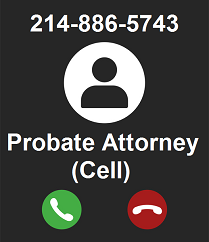Probate: 469.708.6050
Wills & Guardianship: 214.227.6400
13355 Noel Rd., Ste. 1100
Dallas, Texas 75240
Secure the Vehicles
Dealing with the car is a more common executor task. Cars present risk and sometimes, some legwork. For the most part, however, cars are usually easy to deal with.
Find the Car Title
The executor should take immediate possession of the title to the vehicle. You will need it in order to sell or distribute the vehicle. People often keep titles with their other important papers, in a safe deposit box, or sometimes in the glove box. If you cannot locate the title, you should check to see if there is a loan or lien against the vehicle. Often times the original title will be in the possession of the company or bank financing the vehicle's purchase. If the title is lost, you can obtain a certified copy from the Texas Department of Motor Vehicles. Simply complete an Application for Certified Copy of Title (TxDMV Form VTR-34):
Application for Certified Copy of Title - Form VTR-34)
and mail the form to:
Texas Department of Motor Vehicles
1601-A Southwest Parkway
Wichita Falls, Texas 76302
You can also apply in person by going to a TxDMV office in your area.
Dallas Office
1925 E. Beltline Rd., Ste. 100
Carrollton, Texas 75006
972.478.5200
Fort Worth Office
2425 Gravel Dr.
Fort Worth, Texas 76118
817.285.1500
Keep in mind that the DMV will not issue a copy of the title if there is an outstanding lien against the vehicle. If the lien has been paid but the lien is still noted on the title or in the DMV's records, send a letter to the finance company requesting that it send you a lien release letter on the company's letterhead. You can then send this letter to the DMV with your Application.
Set aside vehicle for use of surviving spouse
The decedent's surviving spouse is entitled to use a vehicle belonging to the estate while the estate is being administered. This is true even if the vehicles are given to another person under the terms of the will. Once the administration is complete, the vehicle can be distributed to the heirs of the estate.
Secure the Vehicles
If the vehicle is not set aside for the surviving spouse, the executor should collect all of the keys for the vehicles and place them under the executor's exclusive control. Furthermore, I recommend that the executor either park the vehicles in the decedent's garage or take the vehicles home to the executor's garage. This will prevent the vehicles from being stolen or damaged.
Maintain Insurance
Vehicles are rolling lawsuits. Furthermore, vehicles are under constant risk of theft and/or damage, such as hail (for out-of-towners, Dallas gets severe hail on a regular basis). Therefore, it is critical that the executor maintain both liability and comprehensive insurance on the vehicles. If the decedent had a policy, the executor should check to see if the vehicle remains covered now that the decedent has passed away. If the vehicle is not covered, then new coverage should be obtained. This may be difficult because if the executor is not the beneficiary of the car, the insurance company may say the executor does not have an "insurable interest" in the vehicle. Talk to your insurance agent to see what is possible.
Sell the Vehicle to a Third Party
If the will authorizes the executor to sell the vehicle, or the heirs are in agreement that the vehicle be sold, then the executor can sell the vehicle by completing the following steps:
Step 1: Obtain the original title or a certified copy of the title to the vehicle.
Step 2: The executor will sign the title on the front and back, attach a copy of the Letters Testamentary or Letters of Administration to the title, and deliver the title and letters to the Buyer.
Step 3: The buyer will then complete an Application for Texas Title and/or Registration (Tx DMV Form 130-U) and submit all of the paperwork to the county tax assessor-collector's office in the county where the buyer resides.
Application for Texas Title and/or Registration - Form 130-U
Step 4: The executor must notify the TxDMV of the vehicle transfer by completing a Texas Motor Vehicle Transfer Notification. This can be done by completing a form or submitting the notification online. Notification will protect the executor and estate from liability for charges incurred by the buyer if submitted within 30 days of the transfer.
Texas Motor Vehicle Transfer Notification - Form VTR-346 (Hardcopy Version)
Texas Motor Vehicle Transfer Notification (Online Version)
Convey the Vehicle to an Heir / Beneficiary of the Estate
If the will devises the vehicle to a certain heir or beneficiary, the executor must transfer the vehicle to that beneficiary. The executor will complete the steps listed as though the executor were selling the vehicle. Additionally, the executor and the beneficiary will need to execute an Affidavit of Motor Vehicle Gift Transfer (Tx DMV Form 14-317) before a Notary Public. When completing the Application for Texas Title and/or Registration (Step 3 aobve), the beneficiary must be sure to check the box marked "$10 Gift Tax" in the Sales and Use Tax Computation section of the Form 14-37.
Valuing the Vehicle
Vehicles belonging to the estate must be listed on the Inventory, Appraisement and List of Claims. The executor can go to Kelly Blue Book (KBB.com) or NADA.com to obtain a local valuation. Autotrader is another source of comparables. CarMax will also give you an appraisal for what it would purchase the vehicle for. It is my experience that this valuation is about a third less than what you can get for the car from a private buyer. If you are an out-of-town executor looking for an easy way out, CarMax is a great option.













